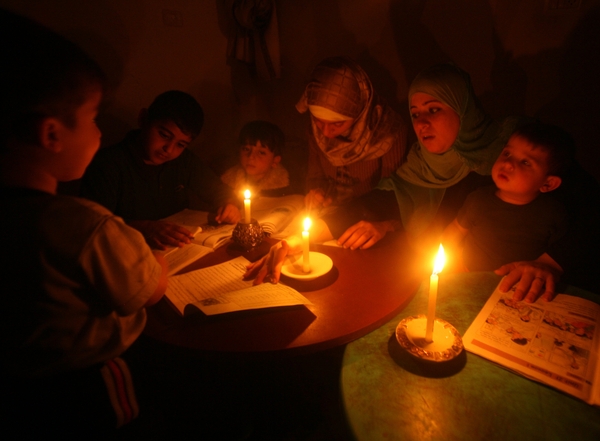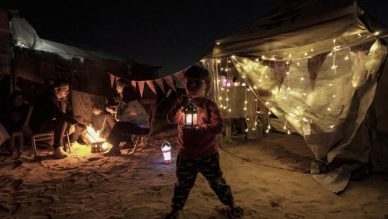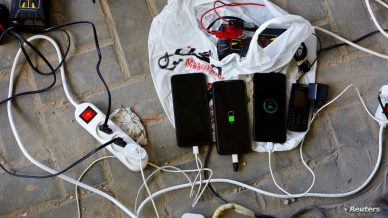The persistent electricity outages crisis is still the major problem facing the population of the Gaza Strip with the people’s suffering increasing in winter especially with the current cold wave which has been sweeping the coastal enclave starting from early December.
Since the current cold wave has begun the number of hours of providing electricity to the Gaza Strip has been reduced with only 3-4 hours of electricity per day in the best cases.
Palestinian citizen Wesam Naji 32 complained in a conversation with the reporter of the Palestinian Information Center about the lack of electricity at his house for long hours. He said “During the day we had electricity for three hours only and electricity went off and on many times during the three hours.”
With his eyes full of sorrow he stressed the desperate need to have electricity as his children and mother suffer a lot especially his mother “who needs continuous follow-up which can’t be done without electricity.”
Despite that his limited income allows him to purchase limited amounts of fuel to run an electrical generator he adds: “The generator can’t work for long hours and it does not give the same quality of electricity.”
The situation of Wesam Naji is not different than that of many Palestinians in the Gaza Strip and Palestinian citizen Ahmad who refused to release his full name is not any different. The bitter situation of Ahmed’s family cannot be denied as his wife gave birth to twins and she always needs warm water in her condition.
The Ministry of Interior in the Gaza Strip has stated that birth rates have increased with the population hitting two millions.
Worsening Crisis
The management of the Gaza Power Plant has expressed its dismay over the Israeli occupation authorities’ (IOA) delay in repairing the Bagdad power line which was damaged in mid-December the thing that makes the electricity crisis in the Gaza Strip even worse.
The management called on the Palestinian government in Ramallah to pressure the IOA to repair the line and reconnect electricity as soon as possible.
It noted “The repeated breakdown in Israeli lines worsens the electricity crisis and increases the inconsistency of the electricity connection timetable all over the Gaza Strip.”
Tariq Lubbad the spokesperson of the power plant revealed that the power plant is suffering from a severe lack of maintenance equipment due to the IOA refusal to allow needed maintenance equipment in for unjustified claims.”
Lubbad said in a press statement “The continuing prevention of maintenance equipment causes disturbance to the networks and affects the services provided by the company to the public especially with the current weather the country is going through.”
He asserted that the amounts of electricity given to the Gaza Strip are not enough and do not meet the Strip’s needs which greatly suffers from the lack of electricity noting that the number of hours of connecting electricity would only improve if the current weather improves.
The Role of the PA
Many Palestinian citizens complain about the Palestinian Authority’s disregard to the suffering of its own citizens in the Gaza Strip as a result of the electricity crisis.
A number of citizens told the PIC reporter that the PA does not assume its duty to solve the electricity crisis.
Last month the first Palestinian International Monetary Conference took place titled “Renewable Energy and Funding Opportunities” without mentioning the chronic electricity crisis in the Gaza Strip.
The conference aims to activate using renewable energy in Palestine at a time the Gaza Strip has been suffering from serious power outages problem for many years now. The conference did not propose a solution to the lingering electricity crisis in the Gaza Strip on its agendas nor proposed any future plan to improve the renewable energy sector in the Gaza Strip.
The Gaza Strip with a population of two million people needs 400 MW of electricity of which 212 MW is available of which Israel provides 120 MW and Egypt provides 32 MW and the Gaza power plan provides 60 MW according to figures published by the Palestinian Natural Resources Authority.














